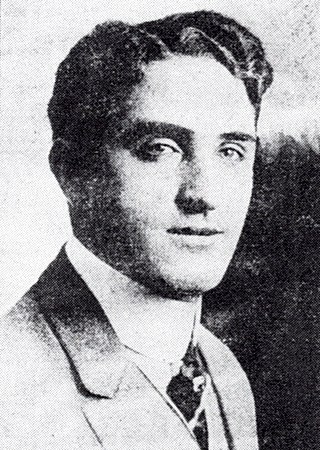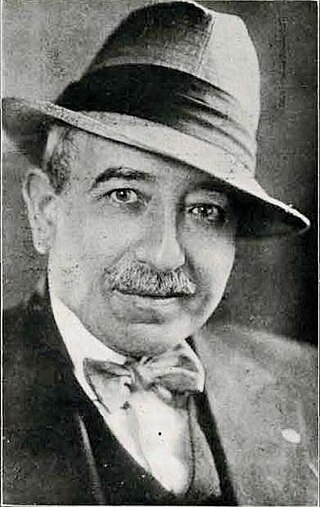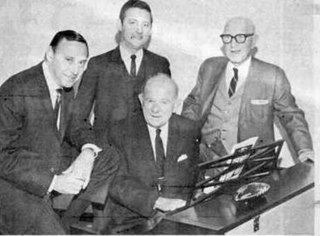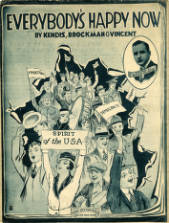
Louis Wolfe Gilbert was a Russian Empire–born American songwriter of Tin Pan Alley. He is best remembered as the lyricist for "Ramona" (1928), the first movie theme song ever written.
James Brockman was an American songwriter. Born in Russia, he emigrated to New York by himself at the age of 9 or 10. His given name was Jacob Brachman but he changed the spelling of the last name because it was mis-pronounced and the rest of the family followed with the change.

"He'd Have to Get Under – Get Out and Get Under " is one of the lengthier titles in the history of popular songs. The song was published in 1913, with music by Maurice Abrahams and lyrics by Grant Clarke and Edgar Leslie.

"Hiawatha " is a song written by Neil Moret in 1901. James J. O'Dea (1870–1914) added lyrics in 1903 and the music was re-subtitled "(His Song to Minnehaha)".

"The Little Lost Child" is a popular song of 1894 by Edward B. Marks and Joseph W. Stern which sold more than two million copies of its sheet music following its promotion as the first ever illustrated song, an early precursor to the music video. The song was also known by its first three words: "A Passing Policeman." The song's success has also been credited to its performance with enthusiasm by Lottie Gilson and Della Fox.

Leopold Feist, in 1897 founded and ran a music publishing firm bearing his name. In the 1920s, at the height of the golden age of popular music, his firm was among the seven largest publishers of popular music in the world. Leo Feist, Inc., ran until 1934.

Abel Baer was an American songwriter, associated with Tin Pan Alley.

"For Your Boy and My Boy" is a 1918 song composed by Egbert Van Alstyne, with lyrics written by Gus Kahn and published by Jerome H. Remick & Co. The song was performed by Al Jolson and later reached No. 4 on the top 100 US songs of 1918 with a cover by the Peerless Quartet.
Irving Bibo was an American composer, songwriter, and publisher.
"A Soldier Speaks" is a song from 1944, with music and lyrics by Peter DeRose, and published by Robbins Music Corp.

Everybody's Happy Now is a World War I song written by James Kendis, James Brockman, and Nat Vincent in 1918. It was published by Kendis-Brockman Music Co. and written for voice and piano.
"When You're a Long, Long Way from Home" is a World War I song written by Sam M. Lewis and composed by George W. Meyer. This song was published in 1914 by Broadway Music Corp.
"We're Going Over the Top" is a World War I song written by Andrew B. Sterling, Bernie Grossman, and Arthur Lange. It was published in 1917 by Joe Morris Music Co., in New York, NY. The sheet music cover, designed by Starmer, illustrates a battlefield scene with a tank moving over the top of a trench and soldiers inside the trench getting out of the way of the tank. Behind the tank soldiers march up the field.

"The Dream of a Soldier Boy" is a World War I song written by Al Dubin and composed by James V. Monaco. It was published in 1917 by Witmark & Sons in New York City. The sheet music cover depicts a photo of a soldier embracing his mother while a proud father and others look on.
Oh, Charlie is My Darling is a song by Irving Bibo from 1927 and was published by Bibo, Boedon & Lang.

Swanee Shore: is a song composed by Sidney D. Mitchell, Arthur Fields and Irving Kaufman in 1919 and published by Leo Feist Inc.
Lou Davis was an American songwriter, and author associated with Tin Pan Alley. He was also a businessman in the wholesale meat business. His primary musical collaborators were Abel Baer, Henry Busse, Harold Arlen, Henry Lange, and J. Fred Coots. Several of his most notable songs include "Hot Lips", "A Precious Little Thing Called Love", "Deep in the Arms of Love", "Here Comes My Ball and Chain", and "I'm Croonin' a Tune About June".
"It's a Lovely Day Tomorrow" is a song written in 1938 by composer Irving Berlin. The song came out of a conversation with British / Hungarian film producer Alexander Korda in a New York taxi cab in 1938. The Munich agreement had just depressed both men. Korda asked Berlin if he had written a war song yet, and a few blocks later Berlin came up with the tune and lyrics.
Robert A. King was a prolific early twentieth century American composer, who wrote under pen names including the pen names, Mary Earl, Robert A. Keiser, and Betty Chapin.
Lucky Lindy or Charles Lindbergh (1902–1974) was a U.S. aviator.










